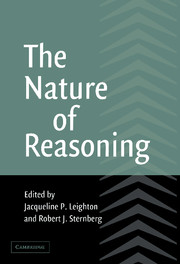Book contents
7 - Mental Models and Reasoning
Published online by Cambridge University Press: 05 July 2011
Summary
Let us begin with three problems that call for you to reason:
Suppose that you are on the jury of a murder trial, and that two propositions are established beyond a reasonable doubt: The stabbing occurred on an Amtrak train to Washington, and the suspect was in a cinema at the time of the stabbing. What conclusion would you draw? You may want to take a pencil and paper, and record your answer to this problem and the two that follow.
Suppose that you have the following information: Either Omar is in Kandahar or at least he is in Afghanistan. In fact, he is not in Afghanistan. Is he in Kandahar: “yes,” “no,” or “don't know”?
You park your car in London on a double yellow line drawn at the side of the road. When you return, you car has been wheel-clamped, and a note on the windshield tells you where to pay the fine to get the wheel released. What offense have you committed?
Nearly everyone responds to problem (1): the suspect is innocent. They respond to problem (2): no, he is not in Kandahar. And they respond to problem (3): the offense was to park in a “no parking” zone. Our ability to reason is perhaps our preeminent cognitive skill. Without it, as these examples show, daily life would be impoverished, and there would be no science or mathematics, no legal systems or social conventions.
- Type
- Chapter
- Information
- The Nature of Reasoning , pp. 169 - 204Publisher: Cambridge University PressPrint publication year: 2003
- 3
- Cited by

